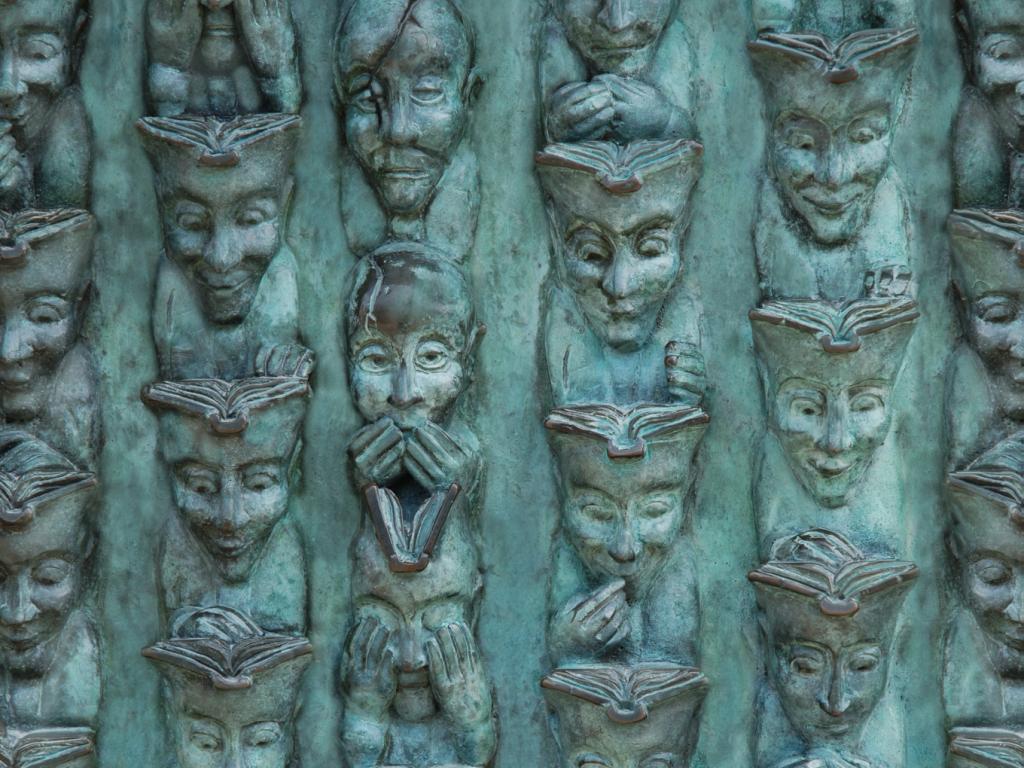Knowledge : Generation in Generation, an eye-opening art piece you can find in La Rochelle, by Bruce Krebs.

Knowledge : Generation in Generation, an eye-opening art piece you can find in La Rochelle, by Bruce Krebs
During a leisurely walk along Rue des 2 Moulins in La Rochelle, one can come across a fascinating work of art called “Generation in Generation” by Bruce Krebs, which is displayed on the historic walls of the port. At first glance, it may go unnoticed, but it is truly worth taking the time to comprehend its significance.
If you ask his creator Mr. Bruce Krebs he will reply: “It’s the story of people who read in the heads of people who read, themselves in the heads of other people, and so on… A bit like the transfer of a culture from generation to generation … But sometimes one of them refuses to read, and as a result, everything goes downhill, and there is no recourse.”
This artwork represents the transfer of knowledge from one generation to another, which is generally regarded as a transfer from older to younger individuals. However, there are many other perspectives to consider, as knowledge transfers can happen between peers or from younger to older individuals. Each context adds new dimensions to the transfer of knowledge.
The word “knowledge” often carries a positive connotation as it is linked with growth, progress, and elevation. However, sharing knowledge can also have negative implications. In some cases, certain beliefs or habits may not be beneficial to transfer or maintain across generations.
Indeed, beliefs and habits often represent the values and identity of a community, country, or corporation, and define them in a particular manner. People identify themselves with these values and take pride in being a part of them. It is important to recognize which knowledge transfers may lead to trauma, stress, hate, conflicts or division in a society or organization.
By this understanding of the impact on others, the know-how and experience can be used to improve our environment. Being willing to recognize when we made a mistake to avoid repetition is necessary. This can be seen as a first step in knowledge sharing. How not to repeat the same mistake over and over?
Individuals tend to repeat what they learn or experience in life, even if it is a negative feeling. It is an unwritten law or sort of unspoken rule. This phenomenon is well seen in human history when different event leads to the same results due to similar decisions. Knowledge is also power. How to use it well? Should we consider potential fallout in decision-making?
It is crucial for individuals to share their knowledge with others, but unfortunately, some may refuse to do so. This causes a break in the chain of knowledge and disrupts the transfer of knowledge within a corporation. As a result, the next person may have to learn from their own experiences and mistakes, which can take longer to reach the same level as the previous generation or employee. This can lead to various issues and cause the core knowledge to slowly vanish.
Furthermore, fear can hold some people back from sharing their knowledge. This fear can be caused by the risk of losing their position, being surpassed by others, or simply thinking they are not good enough. This can result in a complete stop in knowledge-sharing, which can lead to further issues within the corporation. How can we ease the fear of knowledgeable individuals and make them feel safe to share?
Several questions arise from this artwork regarding the direct impact of the transfer of knowledge in our society. Interpretations are wide, depending on the background of each peer who will look at “de génération en génération” from Bruce Krebs.
Sharing knowledge on a daily basis can be a challenge for individuals and companies. It’s crucial to create a safe environment where everyone is encouraged to share, and new perspectives are welcomed.
Our diverse backgrounds, cultures, and beliefs can sometimes make us cautious when we encounter new ideas. It’s important to acknowledge that there is no one truth and approach knowledge transfer with an open mind.
What actions are you taking to improve and optimize the transfer of knowledge within your organization?
Ceicia offers effective solutions to foster continuous improvement and anticipate the risk.
Stay tuned. Ceicia publishes one article per month, related to different subjects.

Ceicia’s founder